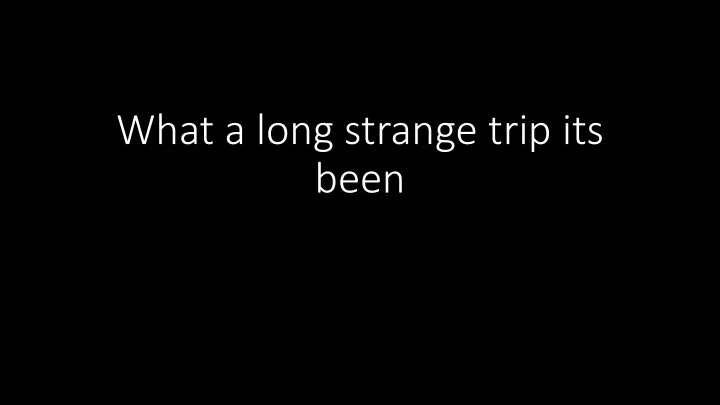

What a long strange trip its been
Overview • High level view of the history of the consumer-survivor community • Not dates but themes • Provide a context for the rest of the afternoon
Way back when …… . • De-institutionalization began in the sixties • Consumer-Survivor movement influenced and inspired by the various movements – Peace movement, women’s movement, Gay Pride movement • Grew out of a desire to address abuses, discrimination and isolation associated with “mental illness” • Went from being “outsiders” to “insiders” to “reluctant participants”
The Seventies: We’re Not Going to Take It • Groups started forming in Vancouver, Toronto • On Our Own – Chamberlin • Mad People’s Liberation Movement • Survived the system despite the system’s intent to help
The Seventies cont’d • In Toronto, Lakeshore Psychiatric Hospital closes – concern about what to do with those that were once housed there • In Vancouver, former in-patients start to band together to offer each other support • Growth of survivor voice critical of the way people were treated by the system ( Don Weitz, Bonnie Burstow, Judi Chamberlin, etc.)
The Eighties …… Making noise, being heard? • The Coalition against Electroshock, Mad Market, Phoenix Rising • Pat Capponi organizing in High Park (Starkman, Weitz, Burstow) • Heseltine report, 1983 • Graham Report 1988
The Eighties …… . • Groups of c/s began to form in various communities (Toronto, Kitchener as examples) • Supportive and helped people find community – political activity against the system • Money flowed into community mental health – supportive housing, etc. • Broadening social movement • Shift in policy – Graham Report 1988 – involved survivors
The Nineties.... Taken Seriously? • NDP Anti-Recession money • CSDI – OPDI • Putting People First : 1993 • @ 30 CSI programs funded throughout the province • CIF funding – mid 90’s – added more CSI’s
The Nineties …… .. • With funding there came a shift to becoming providers of “service” • Can CSI’s be leaders in a social movement and accept gov’t funding to provide service • Some CSI’s did well, others faltered and lost funding – led to the question was funding a set-up? • Making it Happen – 1999 • Heightened focus on the role and involvement of consumers in planning, developing and evaluating of services
The new millennium … slip, sliding away • Introduction of the LHINS • Every Door is the Right Door (2009) • Recovery became a big thing in the early part of the 2000’s – not so much towards the end • Lots of talk about the importance of consumer and family involvement
The new millennium ……… .. • Continued talk about the importance of consumers, little action • Shift away from Consumer organizations and more focus on individual peer workers • CSI Builder (2009) – recommendations on how to support CSI’s made: none of the recommendations implemented • CSI’s are merged with other mainstream orgs – number of free standing CSI’s decreasing • Greater emphasis on accountability - numbers
Where are we now … .. • Fewer independent CSI’s • Role of advocacy diminished – remaining org’s struggle to keep up • Flip side – some money has flowed for Peer Workers • Minster’s Advisory Council Mental Health
Present day – Right Here, Right Now • Uneven approach by LHIN’s to consumer orgs – how things are done varies from LHIN to LHIN • Mergers with mainstream orgs. vary in how “autonomous” CSI’s are able to be • There is less of a focus/interest on CSI’s and more on peer workers • Investigating the State of Peer Work in Ontario – 2014 • Professionalization of peer support • Peer Support Canada
What does all this mean ? • We are at a crossroads – are we still a social movement or are we service providers ? • What do we focus on? • Are we still relevant?
What does the future hold?
Some ideas … . • Do we become professional – establish a college with guidelines for certification, training, code of conduct , etc. • Do we advocate for the protection of CSI’s or do we push for more peer workers, or do we do both • Do we continue to push for more funding from gov’t or do we seek funds from elsewhere • Do we say “screw it” and walk away
At end of it all • There has been a rich history of consumer activism that has produced phenomenal results … • We have had our challenges and we are still here • If not us then who?
Some men see things the way they are and ask why?, I dream things that never were and ask why not?
Recommend
More recommend